小学英语一般将来时
2023年小学英语六年级小升初语法总复习(四)一般将来时 (译林版含答案)
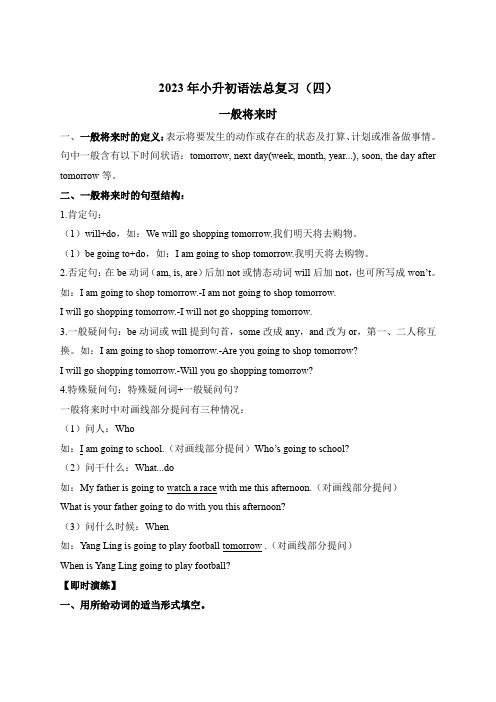
2023年小升初语法总复习(四)一般将来时一、一般将来时的定义:表示将要发生的动作或存在的状态及打算、计划或准备做事情。
句中一般含有以下时间状语:tomorrow, next day(week, month, year...), soon, the day after tomorrow等。
二、一般将来时的句型结构:1.肯定句:(1)will+do,如:We will go shopping tomorrow.我们明天将去购物。
(1)be going to+do,如:I am going to shop tomorrow.我明天将去购物。
2.否定句:在be动词(am, is, are)后加not或情态动词will后加not,也可所写成won’t。
如:I am going to shop tomorrow.-I am not going to shop tomorrow.I will go shopping tomorrow.-I will not go shopping tomorrow.3.一般疑问句:be动词或will提到句首,some改成any,and改为or,第一、二人称互换。
如:I am going to shop tomorrow.-Are you going to shop tomorrow?I will go shopping tomorrow.-Will you go shopping tomorrow?4.特殊疑问句:特殊疑问词+一般疑问句?一般将来时中对画线部分提问有三种情况:(1)问人:Who如:I am going to school.(对画线部分提问)Who’s going to school?(2)问干什么:What...do如:My father is going to watch a race with me this afternoon.(对画线部分提问)What is your father going to do with you this afternoon?(3)问什么时候:When如:Yang Ling is going to play football tomorrow .(对画线部分提问)When is Yang Ling going to play football?【即时演练】一、用所给动词的适当形式填空。
小学六年级英语一般将来时四个句型
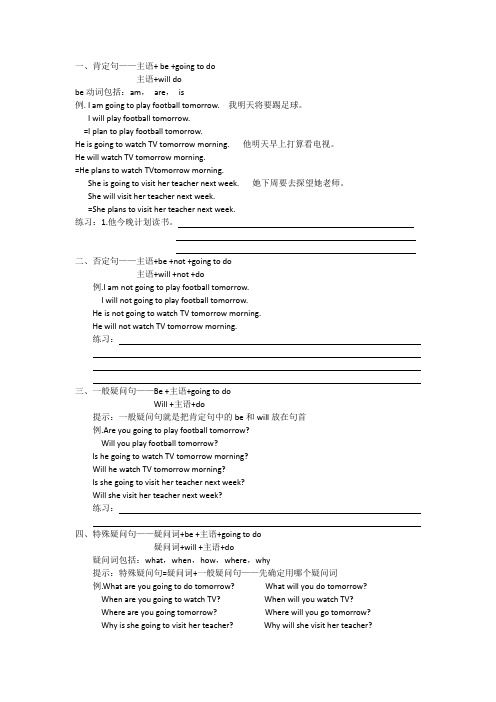
一、肯定句——主语+ be +going to do主语+will dobe动词包括:am,are,is例. I am going to play football tomorrow. 我明天将要踢足球。
I will play football tomorrow.=I plan to play football tomorrow.He is going to watch TV tomorrow morning. 他明天早上打算看电视。
He will watch TV tomorrow morning.=He plans to watch TVtomorrow morning.She is going to visit her teacher next week. 她下周要去探望她老师。
She will visit her teacher next week.=She plans to visit her teacher next week.练习:1.他今晚计划读书。
二、否定句——主语+be +not +going to do主语+will +not +do例.I am not going to play football tomorrow.I will not going to play football tomorrow.He is not going to watch TV tomorrow morning.He will not watch TV tomorrow morning.练习:三、一般疑问句——Be +主语+going to doWill +主语+do提示:一般疑问句就是把肯定句中的be和will放在句首例.Are you going to play football tomorrow?Will you play football tomorrow?Is he going to watch TV tomorrow morning?Will he watch TV tomorrow morning?Is she going to visit her teacher next week?Will she visit her teacher next week?练习:四、特殊疑问句——疑问词+be +主语+going to do疑问词+will +主语+do疑问词包括:what,when,how,where,why提示:特殊疑问句=疑问词+一般疑问句——先确定用哪个疑问词例.What are you going to do tomorrow? What will you do tomorrow?When are you going to watch TV? When will you watch TV?Where are you going tomorrow? Where will you go tomorrow?Why is she going to visit her teacher? Why will she visit her teacher?。
小学英语一般将来时

一般将来时1、第一人称(we 和I)用shall:shall+动词原形意义: 一般单纯地表示将来某个时间将要发生的动作或存在的状态。
肯定句:We shall go on the Pearl River.否定句:We shall not/shan’t go on the Pearl River.一般疑问句:-- Shall we go on the Pearl River?--Y es, we shall. /No, we shall not/shan’t.特殊疑问句:--When shall we go on the Pearl River?--Tomorrow morning.2、第一、二、三人称用will: will+动词原形意义: 一般单纯地表示将来某个时间将要发生的动作或存在的状态。
肯定句:He will go on the Pearl River.否定句:He will not/won’t go on the Pearl River.一般疑问句:--Will he go on the Pearl River?--Y es, he will. /No, he won’t.特殊疑问句:--When will he go on the Pearl River?--Tomorrow morning.3、第一、二、三人称用be going to+动词原形意义:用来表示近期将要发生的动作或存在的状态,以及计划、安排、打算要做的事。
肯定句:He is going to watch birds there.否定句:He is not/isn’t going to watch birds there.一般疑问句:--Is he going to watch birds there?--Y es, he is. / No, he isn’t.特殊疑问句:--What is he going to do?-- He is going to watch birds there.4、用现在进行时表示表示位置转移的动词(如:go, come, leave, start, arrive等),可用现在进行时表示将来时。
小学英语语法句型转换-一般将来时(全国通用版)
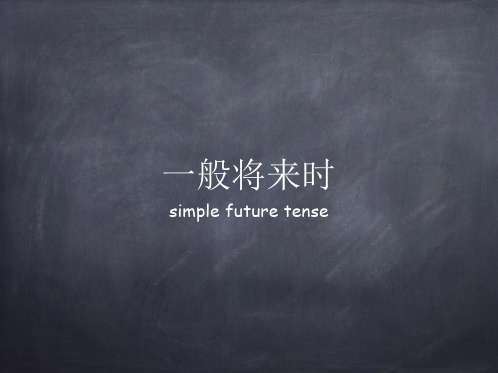
练习
加not
提变态
将下列陈述句变成否定句和一般疑问句,
一般疑问句作肯定回答和否定回答
I am going to wash my clothes tomorrow.
否定句:
I am not going to wash my clothes tomorrow.
一般疑问句️:
Are you going to wash your clothes tomorrow?
am going to go
will go
1.I am tired. I __________
(go) to bed early
tonight.
2.Mary’s birthday is next Monday. Her brother
_____________(give)
her a present.
如:
—Are you going to the park next week?
下周你打算去公园吗?
—Yes, I am. 是的,我打算去。
—Is your grandpa going to learn English
this Sunday? 这周日你爷爷将去学英语吗?
—No, he isn’t. 不,他不去。
当主语是 I 时,be 用 am;当主语是第三人称单数时,be 用
is;当主语是其他人称时,be 用 are。
2. will/ shall +动词原形
表示将要发生的动作或情况,没有太多的计划性,还可用来
表示意愿。主语是第一人称时常用 shall,也可用 will;其他
情况全部用 will。
一般将来时的句式结构
(2) 只用be going to不用will的情况
小学一般将来时讲解

小学一般将来时讲解1. 介绍小学一般将来时是英语语法中的一种时态,用来表示将来发生的行动或事件。
在这种时态中,动作与时间的关系是相对的,即动作将在将来某一时刻发生。
2. 构成小学一般将来时由情态动词 "will" 或 "shall" 加上动词原形构成。
下面是一些例子:- I will go to school.- She will play basketball.- We shall see a movie.3. 肯定句结构小学一般将来时的肯定句结构是:主语 + will/shall + 动词原形+ 其他。
4. 否定句结构小学一般将来时的否定句结构是:主语 + will/shall + not + 动词原形 + 其他。
5. 疑问句结构小学一般将来时的疑问句结构是:Will/Shall + 主语 + 动词原形+ 其他?6. 使用场景小学一般将来时常用于以下场景:- 表示未来的计划或打算:I will go to the park tomorrow.- 表示预测:It will rain later.- 表示意愿或请求:Will you help me with my homework?7. 注意事项在小学一般将来时中,我们要注意以下几点:- 不使用"will"或"shall"来表达对他人的承诺或决定,如"I promise"或"I decide"。
- 在口语中,经常使用"will"而不是"shall"。
- 在第一人称疑问句中,我们可以使用"shall"代替"will",但这并不常见。
希望这份文档对你的小学一般将来时的学习有所帮助!。
小学五年级重点知识归纳一般将来时的用法与句型构造

小学五年级重点知识归纳一般将来时的用法与句型构造【小学五年级重点知识归纳:一般将来时的用法与句型构造】一、一般将来时的用法一般将来时表示将来某个时间会发生的事情或者存在的状态。
它通常用来表达计划、打算、预测、意愿等。
二、一般将来时的句型构造1. 肯定句结构:主语 + will + 动词原形 + 其他成分例句:I will go to the park tomorrow.2. 否定句结构:主语 + will not / won't + 动词原形 + 其他成分例句:She won't eat dinner with us tonight.3. 疑问句结构:Will + 主语 + 动词原形 + 其他成分?例句:Will they visit their grandparents this weekend?4. 特殊疑问句结构:特殊疑问词 + will + 主语 + 动词原形 + 其他成分?例句:Where will you go on your vacation?三、一般将来时的常见时间状语1. tomorrow(明天)2. next week(下周)3. in the future(将来)4. soon(很快)5. in a year(一年后)等等四、一般将来时的其他用法1. 表示预测或推测的句子,常使用的词汇有:think,believe,hope,expect等。
例句:I think it will rain later.我认为一会儿会下雨。
2. 表示意愿、请求、建议等情态动词的用法。
例句:I will help you with your homework.我会帮你写作业。
五、一般将来时使用注意事项1. 在一般将来时中,主语为第三人称单数时,动词要加上“s”或者“es”。
例句:He will playsoccer with his friends tomorrow.2. 一些动词在一般将来时的变化形式是不规则的,需要特别注意。
小学英语语法时态一般将来时详解

小学英语语法时态一般将来时详解一、概念一般将来时表示将来某一时刻的动作或状态;或将来某一段时间内经常的动作或状态..一般将来时由助动词shall第一人称;will第二、三人称+动词原形构成..美国英语则不管什么人称;一律用will..二、一般将来时的形式●will 常简略为'll;并与主语连写在一起;如:I'll;he'll;it'll;we'll;you'll;they'll..●一般疑问句如用Will you…其简略答语须是Yes;I will或 No;I will not;如用 Shall you…较少见其简略答语须是 Yes;I shall.或 No; I shall not...三、一般将来时的用法1表示将来的动作或状态一般将来时常与一些表示将来的时间状语连用;如:tomorrow明天; next week 下周; from now on从现在开始;in the future将来等..2表示将来经常发生的动作..一般将来时表示将来某一时刻的动作或状态;其表达形式除了“shall第一人称;will第二、三人称+动词原形构成”外;还有以下几种形式..1“to be going to+动词原形”表示即将发生的或最近打算进行的事..例如:①It is going to rain. 要下雨了.. ②We are going to have a meeting today. 今天我们开会..2go;come;start;move;sail;leave;arrive;stay等可用进行时态表示按计划即将发生的动作;例如: I'm leaving for Beijing. 我要去北京..3“be to+动词原形”表示按计划要发生的事或征求对方意见..例如:①Are we to go on with this work 我们继续干吗②The boy is to go to school tomorrow.这个男孩明天要去上学..4“be about to+动词原形”表示即将发生的动作;意为:很快;马上..后面一般不跟时间状语..例如: We are about to leave.我们马上就走..5某些词;如come; go; leave; arrive; start; get; stay 等的一般现在时也可表示将来..①The meeting starts at five o'clock.会议五点开始..②He gets off at the next stop.他下一站下车四、一般将来时特点1shall用于第一人称;常被will 所代替..will 在陈述句中用于各人称;在征求意见时常用于第二人称..Which paragraph shall I read first Will you be at home at seven this evening2be going to +不定式;表示将来..a. 主语的意图;即将做某事..What are you going to do tomorrowb. 计划;安排要发生的事..The play is going to be produced next month..c. 有迹象要发生的事Look at the dark clouds; there is going to be a storm.3be +不定式表将来;按计划或正式安排将发生的事.. We are to discuss the report next Saturday.4be about to +不定式;意为马上做某事.. He is about to leave for Beijing.注意:be about to 不能与tomorrow; next week 等表示明确将来时的时间状语连用..五、一般将来时常见用法1、表示将要发生的动作..例如:I shall go to see a friend this evening.2、shall用于第一人称作主语的问句里;表示征求对方的意见或询问情况..例如:Shall I open the door3、will用于第二人称的问句里;征求对方是否愿意或表示客气的邀请或命令..例如:Will you please read the word4、be going to打算、准备做某事或即将发生的事..例如:We are going to plant trees.这种时态由be的将来时形式+现在分词构成..如主语为第一人称;除在疑问句外will要比shall更常用.可用做一般进行时;也可表示不含意图又未发生的动作..5、be to do按计划安排要发生的事或征求对方意见..例如:When is the swimming pool to open6、be going在go;come;leave;stay等按计划安排要发生的事中..这些动词经常具有趋向性..例如:They are leaving here tomorrow.。
小学英语一般将来时

be going to句型的特殊疑问句形式。
疑问词 + be动词 +主语 + going (to) +(动作)+(时间副词)?
常用的疑问词有:
what where when which who how
什么(提问事情) 在哪里 (提问地点) 在什么时候 (提问时间) 选择哪一个(提问人或物) 谁 (提问人) 怎么样 (提问方式)
( B ) 9. We ________ the work this way next time. A. do B. will do C. going to do D. will doing
What is Hui Tailang going to do?
He is going to ski.
What is Lan Yangyang going to do?
He is going to sweep the floor.
What is Xi Yangyang going to do?
一般将来时be going to句式的构成: 主语 + be going to +动词原形/地方 +(将来时间)
visit 1. We are going to grandparents tomorrow. 2. Sheisgoing to go soon. read 3. He is going to books this evening. 4. My parents is are going to Beijing next week. is改为 5. John is go to the park.
①通常用will + V说或写都尽量使用“I’ll, You’ll, He‘ll , She’ll , It’ll, We’ll , They’ll …”的简缩形式 否定形式 :will not = won’t I won‘t see him again.
小学英语一般将来时

一般将来时:
定义:事情发生在将来的时间中。 构成: will + 动词原形
be going to
+
动词原形
构成:will+动词原形
be going to+动词原形
I am going to listen to music.
I will listen to music.
一般将来时句式
否定句: will + not
疑问句: will 放开头 肯定回答:Yes,I will 否定回答:No, I won’t
What will they do ?
They will fly a kite.
They will not fly a kite.
Will will
1/ Sam will do the housework .(变否定句和一般疑问句) __________________________________
2、They will go swimming.(变一般疑问句) _________________________________
3、Mike will go to the park.(变否定句) __________________________________ 4、 I’m going to have a picnic.(翻译句子) _________________________________ 5、I will play with my friends.(变疑问句并作肯定回答) _________________________________
2、他周末准备去拜访他的祖父母。
He will visit his grandparents on sunday.
小学英语语法课件- 一般将来时 (共36张PPT) 全国通用
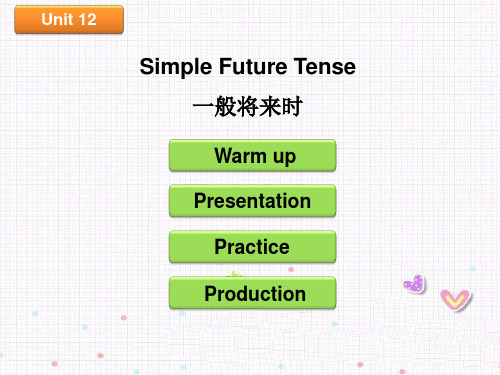
Presentation Sentences
She will take swimming lessons in this vacation. 她今年假期要去学游泳。 She is going to go shopping tomorrow. 她明天要去购物。 Jim will open a shop on internet. 吉姆打算要在网络上开个店。 Jim is going to be an actor when he grows up. Jim长大了想当一名演员。
___t_o_m_o_r_ro_w_.____________________________ 一般疑问句:A__re_t_h_e_c_h_il_d_re_n_g_o_i_ng__to__w_a_tc_h_a_d_o_l_p_h_in_s_h_o_w__
t_o_m_o_r_ro_w_?____________________________ There will be a great concert next week. 否定句:_T_h_e_r_e_w_il_l _n_o_t b_e__a_g_re_a_t_c_o_n_ce_r_t _n_ex_t_w_e_e_k_. ______ 一般疑问句:_W_i_ll_th_e_r_e_b_e_a_g_r_e_a_t _co_n_c_e_rt_n_e_x_t_w_e_e_k?______
Practice Oral Practice
小组合作完成单项选择,并朗读句子
( C ) There __________ a meeting tomorrow afternoon.
A. will be going to
B. will going to be
C. is going to be
(完整版)小学英语一般将来时
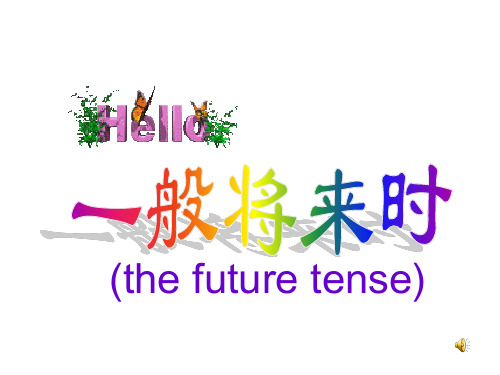
我下周三将要做家务。I will do the housework next Wednesday.
我下周四将要听音乐。I will listen to music next Thursday.
比较下列句子:
1. 我打篮球。 I play basketball.
3. 明天我们要下象棋。We are going to play chess tomorrow.
4. 明天他们要踢足球。They are going to play football tomorrow.
5. 明天露西要听音乐。Lucy is going to listen to music tomorrow.
写出同义句: 1. I am going to eat. → I _wi_ll _ea_t . 2. He is going to eat. → He _w_ill _e_at. 3. She is going to play piano. → She _wi_ll _pl_aypiano. 4. The cat is going to jump. → The cat w_ill _ju_m__p. 5. We are going to fly kites tomorrow. →We _w_ill _fly_k_ite_s tomorrow.
(the future tense)
•I’ m going to buy a book. •I’ m going to bake a cake. •I’ m going to walk near a lake. •We’ re going to take a trip. •I’ m going outside to play. •I’ m going to have a good day.
小学英语一般将来时ppt课件

六、同义句:be going to = will I am going to go swimming tomorrow(明天).
= I will go swimming tomorrow. 七、be going to和will 的区别 be going to和will 的用法虽然都表示将来发生动作或情况, 但它们的用法是有区别的。
19
四、一般疑问句: be或will提到句首,some改为any, and改 为or, 第一二人称互换。 例如:We are going to go on an outing this weekend.
→ Are you going to go on an outing this weekend? 五、对划线部分提问。一般情况,一般将来时的对划线部分有 三种情况。
17
将来时的否定句
• 在be后加not • 在will后加not • will not=won’t • I’m going to have a picnic this afternoon. 改为否定句: He will come back in two days’ time. 改为否定句:
18
一般将来时讲解与练习
1. 问人。Who 例如:I’m going to New York soon. →Who’s going to New York soon. 2. 问干什么。What … do. 例如: My father is going to watch a race with me this afternoon. →What is your father going to do with you this afternoon. 3. 问什么时候。When. 例如:She’s going to go to bed at nine. →When is she going to bed?
小学生英语语法:一般将来时(ppt课件)

学习交流课件
4
三. 与一般将来时连用的时间状语
B
7.Mother ____me a nice presrnt on my next birthday.
A. is going to gives B. is going to give C. gives
B
学习交流课件
10
8. B a concert next Satyrday?
A.There is going to be B. Is there going to be C. There can be
2.否定句:在 be / will 后加not
I am not going to visit Australia. She isn’t going to buy some clothes.
学习交流课件
6
3.一般疑问句句:将 be / will 动词提前。 (主语是第一人称I 时,变一般疑问句时 将I 变you)
this afternoon / evening, tonight 今天… tomorrow (morning / afternoon / evening )明天…
the day after tomorrow 后天
next week / Sunday / month / year下周/…
soon 很快 不久 in three days 三天后 in the future 将来
小学英语语法之一般将来时

小学英语语法之一般将来时小学英语语法之一般将来时在英语语法中,一般将来时是一种常用的时态,它表示将来要发生的事情。
对于小学生来说,理解并掌握一般将来时的规则和用法是非常重要的。
本文将通过定义、基本语法、句型变化、实例分析和注意事项五个方面,详细介绍小学英语语法之一般将来时。
一、定义一般将来时表示将来要发生的事情,通常与时间状语“will”和“shall”相关联。
例如:1、I will go to the park tomorrow.2、Shall we have a party next weekend?二、基本语法一般将来时的基本语法结构包括否定词、肯定词和连接词。
1、否定词:在一般将来时中,否定词通常使用“not”,例如“I will not go to the party.”表示“我不会去参加聚会”。
2、肯定词:肯定词使用频率最高的就是“will”,表示未来的意愿。
例如“She will bring her book tomorrow.”表示“她明天会带她的书”。
3、连接词:连接词在一般将来时中通常是“and”或“or”,例如“Hewill play football and I will watch TV.”表示“他将踢足球,我将会看电视”。
三、句型变化一般将来时有多种句型变化,以下是常见的几种:1、将来式:主语 + will + 动词原形例如:You will have a new friend next week.2、过去式:主语 + would + 动词原形例如:Last week, he would not eat vegetables.3、现在式:主语 + be going to + 动词原形例如:We are going to watch a movie tonight.四、实例分析让我们通过一些具体的例子来分析一般将来时的用法:例1:My parents will visit us next month. 下个月,我的父母将会来看我们。
16小学英语语法:一般将来时语法

一般将来时
否定句:在will动词后 加not,有some变any
We will have a picnic in the park.
We will not going to have a picnic in the park.
一般将来时
否定句:在be动词后加 not,有some变any
They will eat at 12:30.
He is nwoitllgnooint g to play football .
一般将来时
否定句:在will动词后 加not,有some变any She is gowinilgl to run in the playground.
She is nowtilgloninogt to run in the playground.
A.have B.are having C.will have D.has
2.Look at those big black clouds. It __rain.Let`s hurry. D
A.must B.will
C.would
D.is going to
注意:will与be going to的区别,be going to可以表示明显将
变一般疑问句
You will eat some hot dog. Will you eat any hot dog?
变特殊疑问句
We will go home at four.
When will we go home?
变特殊疑问句
I will have a birthday party at home. Where will you have a birthday party?
小学英语一般将来时
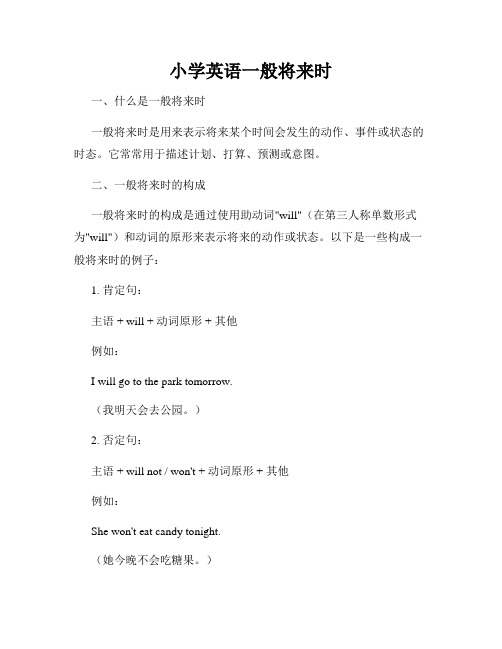
小学英语一般将来时一、什么是一般将来时一般将来时是用来表示将来某个时间会发生的动作、事件或状态的时态。
它常常用于描述计划、打算、预测或意图。
二、一般将来时的构成一般将来时的构成是通过使用助动词"will"(在第三人称单数形式为"will")和动词的原形来表示将来的动作或状态。
以下是一些构成一般将来时的例子:1. 肯定句:主语 + will + 动词原形 + 其他例如:I will go to the park tomorrow.(我明天会去公园。
)2. 否定句:主语 + will not / won't + 动词原形 + 其他例如:She won't eat candy tonight.(她今晚不会吃糖果。
)3. 疑问句:Will + 主语 + 动词原形 + 其他?例如:Will they come to the party?(他们会来参加派对吗?)三、一般将来时的使用场景下面是一些小学英语中常见的使用一般将来时的场景:1. 表示计划或打算:I will visit my grandparents next month.(我下个月会去拜访我的祖父母。
)2. 表示预测或推测:It will rain tomorrow.(明天会下雨。
)3. 表示意愿或承诺:I will help you with your homework.(我会帮你做作业。
)4. 表示未来常态:The school will start at 8:00 AM tomorrow.(明天学校将会在早上8点开始。
)5. 表示请求、命令或建议:Will you please pass me the book?(你能给我递一下那本书吗?)四、注意事项1. "will"后面的动词使用原形形式。
2. 助动词"will"可以缩写成"’ll"。
小学英语语法之一般将来时

一般将来时一、一般将来时:表示将来某个时间要发生的动作、事情,或存在的状态。
二、.结构:▲(1)主语+will/shall+动词原形+(其他)shall用于主语是第一人称单数,will在陈述句中用于各人称.I shall do my homework tomorrow morning.I/He/She/They will do my/his/her/their homework tomorrow morning. He will get up soon.I will=I Shall=I’ll★在表示客观事实的时候只能用此结构。
(1).It will rain tomorrow.明天将要下雨.(2).It will be Teachers'Day the day after tomorrow.后天将是教师节.(3).My birthday will come.我生日将要到了.▲(2)主语+am/is/are going to+动词原形+(其他)a.主语的意图,即将做某事。
I am going to Shanghai tomorrow.b.计划,安排要发生的事。
The play is going to be produced next month。
c.有迹象要发生的事。
Look at the dark clouds,there is going to be a storm.(3)主语+be+to+动词原形+(其他),表示按计划要发生的事或征求对方意见。
We are to discuss the report next Saturday.(4)主语+am/is/are about to+动词原形,意为马上做某事。
He is about to leave for Beijing.(5)主语+be+v-ing,表示将来,表示按计划即将发生的动作,这类动词有go,come,start,move,sail,leave,arrive,stay,live,fly。
小学英语语法一般将来时
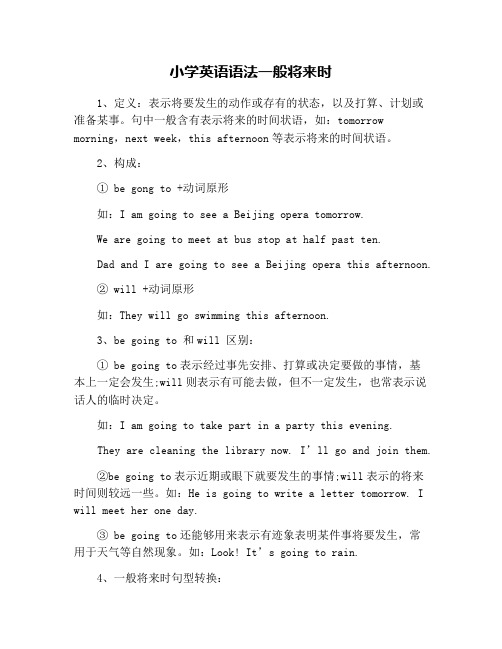
小学英语语法一般将来时1、定义:表示将要发生的动作或存有的状态,以及打算、计划或准备某事。
句中一般含有表示将来的时间状语,如:tomorrow morning,next week,this afternoon等表示将来的时间状语。
2、构成:① be gong to +动词原形如:I am going to see a Beijing opera tomorrow.We are going to meet at bus stop at half past ten.Dad and I are going to see a Beijing opera this afternoon.② will +动词原形如:They will go swimming this afternoon.3、be going to 和will 区别:① be going to表示经过事先安排、打算或决定要做的事情,基本上一定会发生;will则表示有可能去做,但不一定发生,也常表示说话人的临时决定。
如:I am going to take part in a party this evening.They are cleaning the library now. I’ll go and join them.②be going to表示近期或眼下就要发生的事情;will表示的将来时间则较远一些。
如:He is going to write a letter tomorrow. I will meet her one day.③ be going to还能够用来表示有迹象表明某件事将要发生,常用于天气等自然现象。
如:Look! It’s going to rain.4、一般将来时句型转换:肯定句/否定句/一般疑问句及回答She is going to have a picnic tomorrow./She isn’t going to have a picnic tomorrow./—Is she going to have a picnic tomorrow?—Yes, she is. / No, she isn’t.They will go swimming this afternoon./They willnot(wo n’t) go swimming this afternoon./—Will they go swimming this afternoon?—Yes, they will. / No, they won’t.。
- 1、下载文档前请自行甄别文档内容的完整性,平台不提供额外的编辑、内容补充、找答案等附加服务。
- 2、"仅部分预览"的文档,不可在线预览部分如存在完整性等问题,可反馈申请退款(可完整预览的文档不适用该条件!)。
- 3、如文档侵犯您的权益,请联系客服反馈,我们会尽快为您处理(人工客服工作时间:9:00-18:30)。
一般将来时1、:一般将来时表示将来某个时间要发生的动作或存在的状态定义2、结构:主语+will\shall\be going to+v(动词原形)+其他例如:It is going to rain. 要下雨了。
We are going to have a meeting today. 今天我们准备开一个会。
Tomorrow will be Sunday. 明天就是星期天。
The rain will stop soon. 雨很快就要停了。
I shall not go. 我不准备去了。
What shall we do for summer holiday?暑假我们做什么呢?注意:a.will用于所有人称,shall用于第一人称(we.I)b. will 常简略为'll,并与主语连写在一起,如:I'll,he'll,it'll,we'll,you'll,they'll。
c. 一般疑问句如用will you…?其简略答语须是Yes,I will或No,I won't;3、时间标志:常常和表示将来的时间状语连用。
如:tomorrow(明天),next week(下周),from now no(从现在开始),in the future(将来),soon, in 2015, in two days(两天之后)等。
四种句式:1. be going to +动词原形1.肯定句主语+be(am /,is,/ are) going to +动词原形+其它My sister is going to learn English next year. 我姐姐准备明年学英语。
2.否定句主语+be(am / is / are)not going to +动词原形+其它I am not going to(go to)the cinema tonight. 我今天晚上不打算去看电影。
3.一般疑问句Be (am / is / are)+主语+going to+动词原型+其它?Is your father going to play basketball with you ?No , he isn't。
你父亲打算和你去打篮球吗?不。
.4.特殊疑问句特殊疑问词(Wh-)+一般疑问句?Where are you going to spend Spring Fesital.? 春节你打算在哪过?2.will /shall +动词原形(在书面语中,主语是第一人称I,We时,常用shall)1.肯定句主语+will/shall+动词原形+其它I (shall) write to him next week. 下周我将给他写信。
2.否定句主语+ will /shall+ not + 动词原形+其它They won't watch TV this evening。
今天晚上他们不看电视。
3.一般疑问句will/shall+主语+动词原形+其它Will you stay at home with us tomorrow ?明天你和我们呆在家里好吗?4.特殊疑问句特殊疑问词(Wh-) +一般疑问句When will your father be back? 你爸爸什么时侯回来?注意:be或will提到句首,some改为any,and改为or,第一二人称互换。
课堂练习:一、填空1.我打算明天和朋友去野炊。
I_____ _______ _________ have a picnic with my friends.I ________ have a picnic with my friends.2.下个星期一你打算去干嘛?我想去打篮球。
What ________ ________ _________ _________ _________ next Monday?I _______ ______ _____ play basketball。
What _________ you do next Monday?I ________ play basketball..你妈妈这个周末去购物吗?是,她要去买一些水果。
3_____ your mother _______ ________ go shopping this ___________?Yes,she _________. She ______ ________ __________ buy some fruit.4.你们打算什么时候见面。
What time _______ you _________ __________ meet?二、改句子。
5.Nancy is going to go camping.(改否定)Nancy ________ going to go camping.6.I‘ll go and join them.(改否定)I _______ go ______ join them.7.I'm going to get up at 6:30 tomorrow.(改一般疑问句)________ _______ ________ to get up at 6:30 tomorrow?8.We will meet at the bus stop at 10:30.(改一般疑问句)_______ ________ meet at the bus stop at 10:30 ?9.She is going to listen to music after school.(对划线部分提问)________ _______ she ________ ________ _________ after school?10.My father and mother are going to see a play the day after tomorrow.(同上)_________ _________ going to see a play the day after tomorrow.三、用所给词的适当形式填空。
11.Today is a sunny day. We ___________________ (have) a picnic this afternoon.12.My brother _______________ (go)to Shanghai next week.13.Tom often ______________(go)to school on foot. But today is rain。
He to school by bike.)go(______________14.What do you usually do at weekends?I usually ________ (watch)TV and ________(catch)insects?15.It‘s Friday today。
What _____she _________ (do)this weekend?She ______________ (watch)TV and _____________ (catch)insects. 16.What ___________ (d0)you do last Sunday?I ____________ (pick)apples on a farm.What ______________ (do)next Sunday?I ______________ (milk)cows.17.Mary ____________ (visit)her grandparents tomorrow.18.Liu Tao ____________ (fly)kites in the playground yesterday. 19.David ______________ (give) a puppet show next Monday.20.I ________________ (plan)for my study now.作业:一、单项选择。
( ) 1. There __________ a meeting tomorrow afternoon.A. will be going toB. will going to beC. is going to beD. will go to be( ) 2. Charlie ________ here next month.A. isn't workingB. doesn't workingC. isn't going to workingD. won't work( ) 3. He ________ very busy this week, he ________ free next week.A. will be; isB. is; isC. will be; will beD. is; will beThere ________ a dolphin show in the zoo tomorrow evening.) 4. (A. wasB. is going to haveC. will haveD. is going to be( ) 5. –________ you ________ free tomorrow?–No. I ________ free the day after tomorrow.A. Are; going to; willB. Are; going to be; willC. Are; going to; will beD. Are; going to be; will be ( ) 6. Mother ________ me a nice present on my next birthday.A. will givesB. will giveC. givesD. give( ) 7. –Shall I buy a cup of tea for you?–________. (不,不要。
)A. No, you won't.B. No, you aren't.C. No, please don't.D. No, please.( ) 8. –Where is the morning paper?–I ________ it for you at once.A. getB. am gettingC. to getD. will get二、动词填空。
